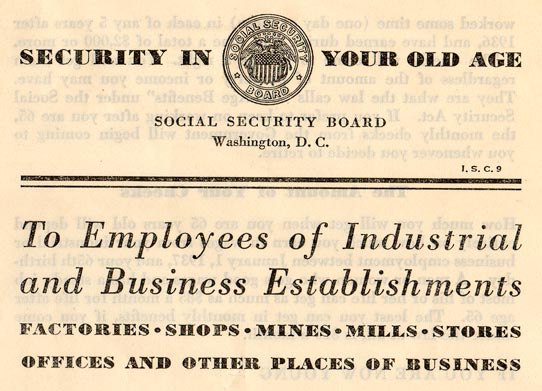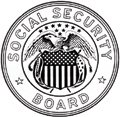The Social Security Act of 1935
What was promised, and what evolved, are a magnitude apart.
|
In 1936, the U.S. Government printed the following pamphlet, "INFORMATIONAL SERVICE CIRCULAR No. 9", to be included with the paycheck of every worker in the U.S. It is well worth the short read. The pamphlet explains the mandatory establishment of Social Security accounts, and made several promises which were not kept. Here are some of the highlights:
• "...you and your employer will each pay 3 cents on each dollar you earn, up to {earnings of} $3,000 a year. That is the most you will ever pay." {$90 per year}
• "The checks will come to you as a right. You will get them regardless of the amount of property or income you may have." {This precludes means-testing.} • "If you should die before you begin to get your monthly checks, your family will get a {lump sum} payment in cash, amounting to 3½ cents on every dollar of wages you have earned after 1936." • "The law also creates an "Old-Age Reserve Account" in the United States Treasury, and Congress is authorized to put into this reserve account each year enough money to provide for the monthly payments you and other workers are to receive when you are 65." {The Social Security Trust Fund should have remained funded.} • "Meanwhile, the Old Age Reserve fund in the United States Treasury is drawing interest, and the Government guarantees it will never earn less than 3 percent." {All U.S. Government bonds currently earning less than 3%.} • "What you get from the Government plan will always be more than you have paid in taxes and usually more than you can get for yourself by putting away the same amount of money each week in some other way." {propaganda} If you find this interesting, please use the links at the bottom of this page, or under the "SHARE" tab at the top, to forward to your friends.
To see how your Social Security account would have fared, if private accounts were allowed, try our Social Security Privatization Calculator. (Be sure to share this with friends.) Here is the text, suitable for Copy/Paste: |
 (click to read original ISC-9 pamphlet) |

SECURITY IN YOUR OLD AGE
SOCIAL SECURITY BOARD
Washington, D.C.
Washington, D.C.
I.S.C.9
To Employees of Industrial
and Business Establishments
and Business Establishments
FACTORIES • SHOPS • MINES • MILLS • STORES
OFFICES AND OTHER PLACES OF BUSINESS
OFFICES AND OTHER PLACES OF BUSINESS
Beginning November 24, 1936, the United States Government
will set up a Social Security account for you, if you
are eligible. To understand your obligations, rights, and
benefits you should read the following general explanation.
THERE is now a law in this country which will give about 26
million working people something to live on when they are
old and have stopped working. This law, which gives other benefits,
too, was passed last year by Congress and in called the Social
Security Act.
Under this law the United States Government will send checks every month to retired workers, both men and women, after they have passed their 65th birthday and have met a few simple requirements of the law.
Under this law the United States Government will send checks every month to retired workers, both men and women, after they have passed their 65th birthday and have met a few simple requirements of the law.
WHAT THIS MEANS TO YOU
THIS means that if you work in some factory, shop, mine, mill,
store, office, or almost any other kind of business or industry,
you will be earning benefits that will come to you later on. From
the time you are 65 years old, or more, and stop working, you will
get a Government check every month of your life, if you have
worked some time (one day or more) in each of any 5 years after
1936, and have earned during that time at total of $2,000 or more.
The checks will come to you as a right. You will get them regardless of the amount of property or income you may have. They are what the law calls "Old-Age Benefits" under the Social Security Act. If you prefer to keep on working after you are 65, the monthly checks from the Government will begin coming to you whenever you decide to retire.
The checks will come to you as a right. You will get them regardless of the amount of property or income you may have. They are what the law calls "Old-Age Benefits" under the Social Security Act. If you prefer to keep on working after you are 65, the monthly checks from the Government will begin coming to you whenever you decide to retire.
The Amount of Your Checks
How much you will get when you are 65 years old will depend
entirely on how much you earn in wages from your industrial or
business employment between January 1, 1937, and your 65th birthday.
A man or woman who gets good wages and has a steady job
most of his or her life can get as much as $85 a month for life after
age 65. The least you can get in monthly benefits, if you come
under the law at all, is $10 a month.
IF YOU ARE NOW YOUNG
Suppose you are making $25 at week and are young enough now to
go on working for 40 years. If you make an average of $25 a week
for 52 weeks in each year, your check when you are 65 years old
will he $53 a month for the rest of your life. If you make $50 a
week, you will get $74.50 a month for the rest of your life after
age 65.
IF YOU ARE NOW MIDDLE-
But suppose you are about 55 years old now and have 10 years to
work before you are 65. Suppose you make only $15 a week on
the average. When you stop work at age 65 you will get a check
for $19 each month for the rest of your life. If you make $25 a
week for 10 years, you will get a little over $23 a month from the
Government as long as you live after your 65th birthday.
IF YOU SHOULD DIE BEFORE AGE 65
If you should die before you begin to get your monthly checks,
your family will get a payment in cash, amounting to 3½ cents on
every dollar of wages you have earned after 1936. If, for example,
you should die at age 64, and if you had earned $25 a week for 10
years before that time, your family would receive $455. On the
other hand, if you have not worked enough to get the regular
monthly checks by the time you are 65, you will get a lump sum,
or if you should die your family or estate would get a lump sum.
The amount of this, too, will be 3½ cents on every dollar of wages
you earn after 1936.
TAXES
The same law that provides these old-age benefits for you and
other workers, sets up certain new taxes to be paid to the United
States Government. These taxes are collected by the Bureau of
Internal Revenue of the U. S. Treasury Department, and inquiries
concerning them should be addressed to that bureau. The law also
creates an "Old-Age Reserve Account" in the United States Treasury,
and Congress is authorized to put into this reserve account
each year enough money to provide for the monthly payments you
and other workers are to receive when you are 65.
YOUR PART OF THE TAX
The taxes called for in this law will he paid both by your
employer and by you. For the next 3 years you will pay maybe 15
cents a week, maybe 25 cents a week, maybe 30 cents or more,
according to what you earn. That is to say, during the next 3 years,
beginning January 1, 1937, you will pay 1 cent for every dollar
you earn, and at the same time your employer will pay 1 cent for
every dollar you earn, up to $3,000 a year. Twenty-six million
other workers and their employers will be paying at the same time.After the first 3 years--that is to say, beginning in 1940--you will pay, and your employer will pay, 1½ cents for each dollar you earn, up to $3,000 a year. This will be the tax for 3 years, and then, beginning in 1943, you will pay 2 cents, and so will your employer, for every dollar you earn for the next 3 years. After that, you and your employer will each pay half a cent more for 3 years, and finally, beginning in 1949, twelve years from now, you and your employer will each pay 3 cents on each dollar you earn, up to $3,000 a year. That is the most you will ever pay.
YOUR EMPLOYER'S PART OF THE TAX
The Government will collect both of these taxes from your
employer. Your part of the tax will be taken out of your pay.
The Government will collect from your employer an equal amount
out of his own funds.This will go on just the same if you go to work for another employer, so long as you work in a factory, shop, mine, mill, office, store, or other such place of business. (Wages earned in employment as farm workers, domestic workers in private homes, Government workers, and on a few other kinds of jobs are not subject to this tax.)
OLD-AGE RESERVE ACCOUNT
Meanwhile, the Old-Age Reserve fund in the United States Treasury
is drawing interest, and the Government guarantees it will
never earn less than 3 percent. This means that 3 cents will be
added to every dollar in the fund each year.Maybe your employer has an old-age pension plan for his employees. If so, the Government's old-age benefit plan will not have to interfere with that. The employer can fit his plan into the Government plan.
What you get from the Government plan will always be more than you have paid in taxes and usually more than you can get for yourself by putting away the same amount of money each week in some other way.
Note.--"Wages" and "employment" wherever used in the foregoing mean wages and employment as defined in the Social Security Act.
WHERE TO GET MORE INFORMATION
If you want more information, write to the Social Security Board,
Washington, D. C., or get in touch with one of the following offices:
{addresses omitted for brevity}
INFORMATIONAL SERVICE CIRCULAR No. 9
U. S. GOVERNMENT PRINTING OFFICE

